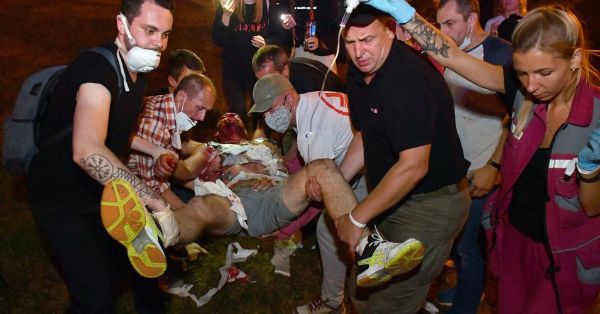'Screams Of Torture' As Authoritarian Govt In Belarus Continues Attacks On Protesters, Journalists
Following what pro-democracy advocates say was a rigged election, world leaders condemn the violence against protestors and the press, and the authoritarian regime's main opponent has fled the country.
by Lisa Newcomb, staff writer

A United Nations official Wednesday joined world leaders in condemning the Belarusian government's violent crackdown on protestors and journalists following last Sunday's presidential election there, which critics have called an undemocratic sham.
"I remind the Belarusian authorities that the use of force during protests should always be exceptional and a measure of last resort, clearly differentiating between any violent individuals and peaceful protesters, against whom force should not be used," Michelle Bachelet, high commissioner for human rights at the U.N., said in a statement.
"State authorities must allow and facilitate the exercise of the rights to freedom of expression and of peaceful assembly and not repress it," she added. "People have the right to speak up and express dissent, even more in the context of elections, when democratic freedoms should be upheld, not supressed."
People have the right to speak up
and express dissent, even more in the context of elections,
when democratic freedoms should be upheld, not
supressed.
—Michelle Bachelet, United
Nations
Belarusian President Aleksander Lukashenko, who Axios reported is known as "Europe's last dictator," has ruled the country in Eastern Europe since 1994. Lukashenko declared victory with 80% of the vote Sunday, after jailing or exiling many of his opponents, leaving Svetlana G. Tikhanovskaya, who's husband was among those jailed, as Lukashenko's main opponent in the election.
Amid mounting protests and reported pressure from Belarusian authorities, Tikhanovskaya fled to Lithuania Tuesday and later released a cryptic video saying she "took a very difficult decision" to leave Belarus.
Meanwhile, protests have continued in Belarus and Lukashenko has detained detractors, arresting more than 6,000 people. At least two protestors have died, and numerous others report abuse at the hands of the Belarusian authorities, which world leaders have condemned. Humanitarian groups including Amnesty International and the Committee to Protect Journalists have also called on the regime to halt its attacks on the press.
Lukashenko's regime appears undeterred by accusations of humanitarian abuse. Belarusian state TV Wednesday broadcast video footage of six visibly beaten protestors with their hands bound behind their backs promising to give up. "Will we be making a revolution?" a guard asks them. "No, never," two reply.
Nonviolent protests carried on in Belarus, including a group of women in the nation's capitol, Minsk, Thursday forming what they called a "chain of solidarity," holding hands and waving flowers and flashing peace signs.
"Free flow of information is crucial in any democratic society, and especially in a context of crisis and social unrest," said Bachelet.
The U.N. commissioner also addressed reports of nationwide internet disruption, which she and others have called an attempt at censorship amid unrest.
"Even more so, in the current situation of the Covid-19 pandemic, and where people might feel compelled to express dissent online rather than on the streets," she said. "The right to peacefully protest online must be also protected."


 Save The Children: ‘It Was Terrifying’ - Children Prepare To Spend Myanmar New Year Festival In Shelters Following Earthquake
Save The Children: ‘It Was Terrifying’ - Children Prepare To Spend Myanmar New Year Festival In Shelters Following Earthquake Global Forest Coalition: Global NGOs Call On International Maritime Org To Reject Biofuels And Commit To Truly Clean Energy
Global Forest Coalition: Global NGOs Call On International Maritime Org To Reject Biofuels And Commit To Truly Clean Energy Australian Catholic University: Principals Navigate Growing Challenges As Anxiety, Depression Increase And Violence, Workloads Intensify
Australian Catholic University: Principals Navigate Growing Challenges As Anxiety, Depression Increase And Violence, Workloads Intensify SNAP: Survivors Deliver Vos Estis Lux Mundi Complaints Against Six Cardinals To Vatican Secretary Of State Parolin
SNAP: Survivors Deliver Vos Estis Lux Mundi Complaints Against Six Cardinals To Vatican Secretary Of State Parolin UNICEF Aotearoa NZ: Myanmar Earthquake A Further Blow For Millions Of Children
UNICEF Aotearoa NZ: Myanmar Earthquake A Further Blow For Millions Of Children Greenpeace: 'Desperate And Deceitful'- Deep Sea Mining Frontrunner Turns Its Back On Pacific Nations
Greenpeace: 'Desperate And Deceitful'- Deep Sea Mining Frontrunner Turns Its Back On Pacific Nations